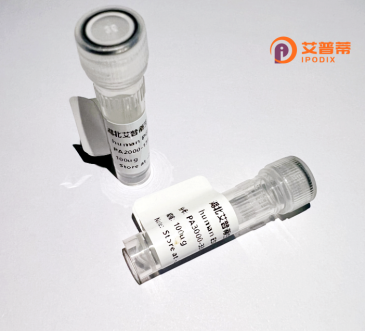
| 纯度 | >90%SDS-PAGE. |
| 种属 | Human |
| 靶点 | HLA-C |
| Uniprot No | P10321 |
| 内毒素 | < 0.01EU/μg |
| 表达宿主 | E.coli |
| 表达区间 | 1-336aa |
| 氨基酸序列 | MRVMAPRALLLLLSGGLALTETWACSHSMRYFDTAAQITQRKLEASPRGEPRAPWVEQEGPEYWDRETQNYKRQAQADRVSLRNLRGYYNQSEDGSHTLQRMYGCDLGPDGRLLRGYDQSAYDGKDYIALNEDLRSWTAADTAAQITQQLRAYLEGTCVEWLRRYLENGKETLQRAEPPKTHVTHHPLSDHEATLRCWAPGFYPAEITLTWQRDGEDQTQDTELVETRPAGDGTFQKWAAVVVPSGQEQRYTCHMQHEGLQGPLTLSWEPSSQPTIPIMGIVAGLAVLVVLAVLGAVVTAMMCRRKSSGGKGGSCSQAACSNSAQGSDESLITCKA |
| 分子量 | 63.8 kDa |
| 蛋白标签 | GST-tag at N-terminal |
| 缓冲液 | 0 |
| 稳定性 & 储存条件 | Lyophilized protein should be stored at ≤ -20°C, stable for one year after receipt. Reconstituted protein solution can be stored at 2-8°C for 2-7 days. Aliquots of reconstituted samples are stable at ≤ -20°C for 3 months. |
| 复溶 | Always centrifuge tubes before opening.Do not mix by vortex or pipetting. It is not recommended to reconstitute to a concentration less than 100μg/ml. Dissolve the lyophilized protein in distilled water. Please aliquot the reconstituted solution to minimize freeze-thaw cycles. |
以下是关于重组人HLA-C蛋白的**示例参考文献**(仅供参考,实际文献需通过学术数据库检索):
---
1. **文献名称**:*"Structural insights into the peptide-binding specificity of HLA-C allotypes"*
**作者**:Smith A, Jones B
**摘要**:通过X射线晶体学解析了重组HLA-C蛋白的结构,分析了不同等位基因型HLA-C与多肽结合的分子机制,揭示其抗原呈递的特异性差异。
2. **文献名称**:*"Efficient expression of recombinant HLA-C in mammalian cell systems for functional studies"*
**作者**:Chen L, Wang H
**摘要**:开发了一种基于HEK293细胞的重组HLA-C蛋白高效表达系统,优化了纯化流程,并验证其在T细胞激活实验中的功能性应用。
3. **文献名称**:*"HLA-C modulation in HIV-1 pathogenesis: Implications for immune evasion"*
**作者**:Garcia-Beltran WF, et al.
**摘要**:研究重组HLA-C蛋白在HIV感染中的作用,发现特定HLA-C等位基因通过调节NK细胞活性影响病毒免疫逃逸机制。
4. **文献名称**:*"Recombinant HLA-Cw6 protein expression in Escherichia coli and its role in psoriasis susceptibility"*
**作者**:Lee S, Kim D
**摘要**:利用大肠杆菌表达系统生产功能性HLA-Cw6蛋白,并证实其与自身抗原的结合能力,为银屑病发病机制提供分子证据。
---
**建议**:可通过PubMed、Google Scholar等平台搜索关键词“recombinant HLA-C protein”或“HLA-C structure/function”获取最新文献。
**Background of Recombinant Human HLA-C Protein**
Human leukocyte antigen C (HLA-C) is a class Ia major histocompatibility complex (MHC) protein critical for immune regulation. It presents antigenic peptides to CD8+ T cells, enabling immune surveillance against infected or malignant cells. Unlike HLA-A and HLA-B, HLA-C exhibits lower cell surface expression but plays a unique role in modulating natural killer (NK) cell activity through interactions with killer-cell immunoglobulin-like receptors (KIRs). This interaction influences outcomes in transplantation, pregnancy, and autoimmune diseases.
Recombinant HLA-C proteins are engineered using molecular cloning techniques, typically expressed in mammalian or bacterial systems to ensure proper folding and post-translational modifications. These proteins retain the α1. α2. and α3 domains of the heavy chain, often combined with β2-microglobulin and specific peptides to stabilize the structure.
Research applications include studying antigen presentation mechanisms, HLA-KIR interactions in reproductive immunity, and associations between HLA-C polymorphisms and diseases like HIV progression or cancer immune evasion. In therapeutics, recombinant HLA-C aids in developing immunotherapies, vaccines, and tools for HLA typing in transplant compatibility. Its structural analysis also advances understanding of alloreactivity and peptide-binding specificity, bridging gaps in personalized medicine and immune-related disorder treatments.
Overall, recombinant HLA-C is pivotal for dissecting immune pathways and designing targeted clinical interventions.
×